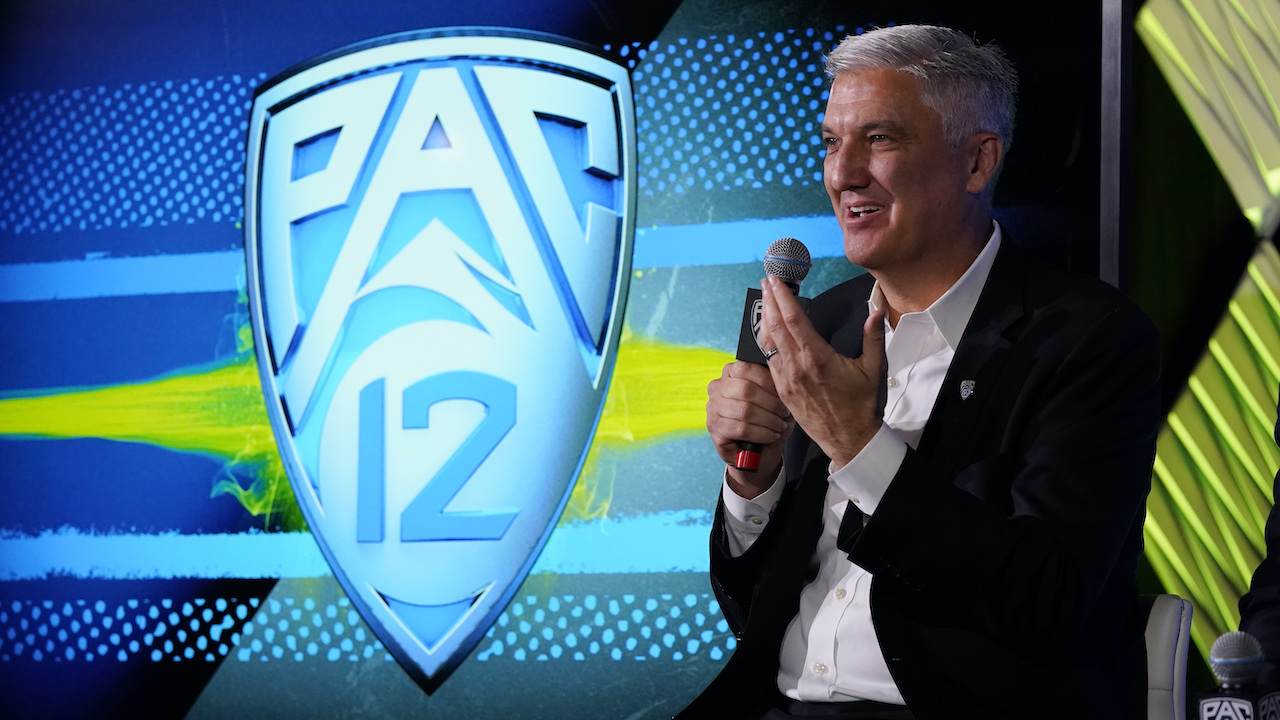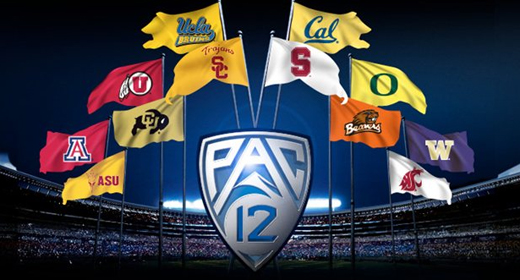The Pac-12 commissioner usually offers a state-of-the-conference address at the men’s basketball tournament, but there is nothing typical about the current affairs as George Kliavkoff attempts to hold the 108-year-old league together.
What will he say this week at T-Mobile Arena in Las Vegas about the critical media rights negotiations, now in their ninth month? Is expansion inevitable? Are all 10 presidents fully committed to a future together?
Our best guess: Kliavkoff won’t utter a peep because there will be no address.
From his perspective, it’s far better to avoid the spotlight altogether than offer a slew of non-answers, denials and obfuscations.
Maintaining a low profile suits his needs — and the wishes of his bosses (the university presidents) — far better than responding to inevitable questions about low-ball offers from ESPN and a raid by the Big 12.
He’s not getting paid by the public utterance; he’s getting paid to cut a deal and lead the Pac-12 into the future.
And the crisis is inching closer to resolution.

Kliavkoff provides the presidents with frequent updates on the state of negotiations — most meetings are held remotely — but the endgame is probably a week or two, or three, away.
We have been surprised numerous times since June 30, when USC and UCLA announced their departures to the Big Ten in 2024. But full clarity and public comments from Kliavkoff this week in Las Vegas would be just short of a jaw-dropper.
He is attempting to move three major decisions on parallel tracks:
— The media rights deal. The cash component matters, but so does the platform. How many football games will be placed on a streaming service (Amazon, Apple or ESPN+)?
— The grant-of-rights agreement that binds each university’s media revenue to the conference, therefore preventing a fissure during the life of the contract.
— The decision on expansion. Should the conference add four schools, two schools or move forward with 10?
On each topic, decision-making authority resides with the presidents.
Major issues require a supermajority vote. Because USC and UCLA are not involved in strategic matters that impact the conference beyond the 2023-24 school year, presidential approval on media rights and expansion will require eight votes (out of 10).
Beyond the regularly scheduled gatherings — one is on the calendar for today, in fact — the presidents have been in frequent contact with each other.
“It’s not just the 10 of us getting together for a meeting,” Washington State president Kirk Schulz told the Hotline in February. “There are individual calls. We’re asking how people are feeling. What are certain schools looking for? There are a lot of conversations going on, and with the commissioner, as well.”
The executive committee, a rotating group of three presidents based on seniority, is at the center of it all.
Washington’s Ana Mari Cauce is the current chair; she took over July 1, the day after USC and UCLA announced their departures. The other members are Schulz and Stanford’s Marc-Tessiere Lavigne.
While not authorized to make decisions for the full board, the executive committee works closely with Kliavkoff and helps funnel the flow of information between the conference office and the full board.
None of the presidents from the so-called Four Corners schools, which are purportedly being wooed by the Big 12, are on the executive committee. But the current mix is worth noting:
— The chair, Cauce, leads one of the two most valuable football brands remaining in the conference. (The other is Oregon, which has an interim president, Patrick Phillips.)
— Another executive committee member, Stanford’s Tessiere-Lavigne, heads the Pac-12’s premier academic institution.
— The third member, WSU’s Schulz, serves on the College Football Playoff’s governing board and has arguably the best grasp of the college sports landscape of any Pac-12 president.
Many details of the endgame are kept hidden from public view.
The executive committee could help Kliavkoff narrow the options for a media deal before he presents to the full board.
Perhaps he will have private conversations with each president in advance of key votes.
The board itself could reach a decision in a single session or require multiple days and meetings.
But in all likelihood, each aspect of this critical, complicated process will be resolved soon.
*** Send suggestions, comments and tips (confidentiality guaranteed) to pac12hotline@bayareanewsgroup.com or call 408-920-5716
*** Follow me on Twitter: @WilnerHotline
*** Pac-12 Hotline is not endorsed or sponsored by the Pac-12 Conference, and the views expressed herein do not necessarily reflect the views of the Conference.
Related posts:
 Pac-12 football preview: Our picks for the conference race, with projected records, analysis and a title game projection
Pac-12 football preview: Our picks for the conference race, with projected records, analysis and a title game projection  Pac-12 survival: Amazon’s Thursday night NFL broadcast could be a peek into the Pac-12’s future
Pac-12 survival: Amazon’s Thursday night NFL broadcast could be a peek into the Pac-12’s future  Pac-12 rewind: USC and Oregon survive, Utah and Washington roll, Ott shines, ASU skids and Stanford get walloped again
Pac-12 rewind: USC and Oregon survive, Utah and Washington roll, Ott shines, ASU skids and Stanford get walloped again 
(AP Photo/Stephen Brashear)
Pac-12 power ratings: USC, Washington hold clear advantage in the schedule ‘misses’
